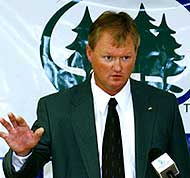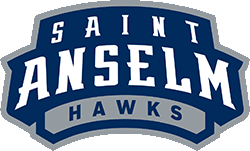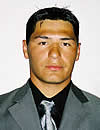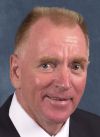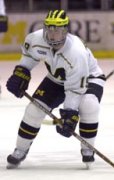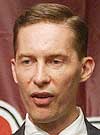You could say Mike Eaves is as interested as anyone in how the Wisconsin Badgers will look this season.
Eaves, hired in March to coach his alma mater, has an idea how he wants his team to look, but admitted he doesn’t yet know what he’ll be working with.
“In terms of climbing up a mountain, you have to set your next run and go after that,” Eaves said. “But I don’t know what run we’re starting at.”
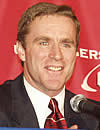
Mike Eaves
Eaves, 46, doesn’t have to wait much longer before he finds out. The Badgers start dry-land training Sept. 3, the first day of the fall semester. The team’s first full-squad practice is one month later, Oct. 3, and it plays Rensselaer at the Kohl Center on Oct. 11.
Eaves laughs. “Pitter, patter.”
Question: In the weeks before you get the players for camp, what are the challenges for you to get ready?
Answer: The thing that we want to get established first is what this coaching staff defines hard work as. Anybody that goes into a program and has success, I think that’s one of the first things they do: They define, from their standpoint, what “hard” is for the kids, and they have to come to understand what that is. And we’re going to find out if the kids can meet that.
Along with that, we want to establish some good work habits, some good character habits. That’ll be our biggest thing; that’s the first hurdle we want to get over when we get the kids back in town.
Q: Is that something that came out of meeting with the players before they left Madison for the summer?
A: No, we would want to do that anyway. You always reflect on the times you’ve been successful and when you study other people that have been successful, it always starts with that. That’s the base of our foundation and that’s what we’re going to go after first.
Q: What are the tenets of hard work in your definition of it?
A: To be more specific about it, the first thing we’re going to establish with our kids is they have to be in great condition. Hockey is a very demanding sport; it uses many energy systems. They’ve got to come in with a good aerobic base and we’ve got to take that and build on it.
Hockey is basically an anaerobic sport without oxygen, where you’re going out there for 45 seconds, you’re busting your hump, but you’ve got to come back to the bench, you’ve got to recover within a minute or two and be as close to 100 percent to go back out there and do it again for 60 minutes. That’s one part of hard.
The second part of hard is the fact that you’ve got to have the heart of a wrestler. There are 50-50 pucks in the game and you’ve got to be able to go and outcompete, whether through quickness and agility or size and strength, you’ve got to win those pucks. You’ve got to win the battles in the trenches, as we call it — the four corners — in front of the net, along the boards, anywhere you are.
We have to have people that are willing to sacrifice their bodies to win games. Specifically, we’ll look at techniques of blocking shots. The teams that win do that.
Q: Does anything from the last few Badgers teams stand out to you that you want to fix?
"[Y]ou’ve got to have the heart of a wrestler. There are 50-50 pucks in the game and you’ve got to be able to go and outcompete, whether through quickness and agility or size and strength, you’ve got to win those pucks."
— New Wisconsin Coach Mike Eaves
A: I haven’t seen this team play. I don’t come in here trying to fix anything; we come in here as a staff — I say that again, we come in here as a staff with a plan of our own, based on our experiences of being successful. That’s our goal.
Q: How important, then, was it to get a pair of assistants that are on the same page as you? (Eaves hired Troy Ward and John Hynes as his assistants. He worked with Ward at Wisconsin-Eau Claire and with the Pittsburgh Penguins; he worked with Hynes in his last job, as head coach of USA Hockey’s National Team Development Program.)
A: In my mind, it was huge. We’re playing catch-up a little bit in that we don’t know the players, they don’t know us. But the fact that the coaching staff knows each other, we’ll be a lot more effective in terms of getting things done that we want to because we don’t have to get used to each other. In my eyes, it was a huge factor. …
I’ve been to war with them. I’ve been through some long bus rides, I’ve been through some good times and bad times and we have survived. You build up a trust level. We don’t have to say anything to each other, we can just look at each other and know exactly what we need to do to get this thing going.
Q: From meeting with the players, what was your impression of what the strengths of your team will be and what might be some of the difficulties?
A: The biggest thing I took out of those meetings is the fact of how excited they were. Any time there’s change, there’s going to be excitement. There was truly excitement in everybody’s voice and their body language.
One of the things we’ll have to deal with, we’ll probably have a little bit of a rollercoaster ride for the first half of the season. And that’s pretty natural. Between us getting to know the guys and their strengths and weaknesses and trying to build new habits and them getting used to us and our demands and ways, there’s going to be some rollercoaster rides. But I think that after Christmas, we’ll know firsthand what we have and what we need to work on.
Q: You’ve said you won’t name a permanent team captain until after Christmas. Why?
A: It’s just something that we as a coaching staff have come to learn over our years dealing with young people. We want them to have ownership in the team and one of the ways you get guys to have ownership is to rotate that captaincy around, and then they vote on it. Because they see firsthand, OK, who’s the guy that can meet certain criteria and be our formal captain. In the process, what you’ve done is you’ve had everybody buy into the fact that they’re an important component of the team, they actually are a captain in their own way.
Q: The Badgers lost a lot of scoring production to graduation after last season. Do you know who you’re going to expect to fill in those scoring roles, or is it going to be trial by error?
A: Not right now, I don’t. (He laughs) We’re going to put some people in positions where they’re going to get the opportunity to show us what they can do and hopefully they’ll be able to take advantage of that. But, no, that’s one of the questions we’re going to have answered as we go along through the year.
Q: So it wouldn’t be too much of a stretch to expect a number of different lineups and line combinations early in the year?
A: Absolutely.
Q: Where do you think you’ll fit into the WCHA this season? What will be success for you?
A: I have no idea where we’re going to end up. Not knowing the league, not knowing our team. Right now, that doesn’t matter. We have a plan that we need to first initiate and establish. Hopefully by Christmas we’ll have a way better idea. …
We’re going to have to be flexible and adaptable as we start the beginning of the year here to figure out what we have.
Q: In recruiting, you must have connections from working with the USA Hockey program. But the last two Badgers superstars — Dany Heatley and Steve Reinprecht — came from Canada. How essential is it to build contacts in that part of the recruiting game?
A: It’s one of the things we want to do, there’s no doubt about it. We’ve already established some contacts up there this summer, trying to get people involved and let them know what we’re looking for and what we need. We’ve started that process already, but you’re right, we need to do that.
Q: Settling into Madison again? (Eaves played at UW from 1974 to 1978)
A: Oh, yeah. It takes me a full year to know a city, but with coming back here I have an idea where I’m going. I may make a wrong turn here or there, but I know how to get back. That’s a nice commodity to have.

